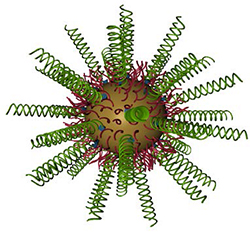
Northwestern Medicine scientists have identified a small RNA molecule called miR-182 that can suppress cancer-causing genes in mice with glioblastoma mulitforme (GBM), a deadly and incurable type of brain tumor.
While standard chemotherapy drugs damage DNA to stop cancer cells from reproducing, the new method stops the source that creates those cancer cells: genes that are overexpressing certain proteins.
“Our study identified miR-182 as a glioblastoma tumor suppressor that reduces the expression of several oncogenes that promote cancer development,” said senior author of the study Alexander Stegh, PhD, an assistant professor in the Ken and Ruth Davee Department of Neurology and Medicine and a member of the Robert H. Lurie Comprehensive Cancer Center of Northwestern University.
The study, published April 1 in Genes and Development, used a nanostructure called spherical nucleic acids (SNAs) to safely deliver miR-182 across the blood-brain barrier to reach tumor cells, where it directly targeted multiple oncogenes at once, increasing cancer cell death and reducing cancer cell growth. SNAs are composed of multiple strands of DNA and RNA densely arranged around a nanoparticle center.
“We demonstrate a more specific, more personalized approach to therapy,” Stegh said. “SNAs are a very promising platform to silence the particular genes that drive or contribute to cancer progression in individual patients.”
There are 16,000 new cases of GBM reported in the U.S. every year. Patients have a very poor prognosis, with median survival of just 14 to 16 months.
The molecule miR-182 is a microRNA, a type of short non-coding RNA that can bind to hundreds of genes to reduce their protein expression in cells. Looking at large-scale genomic datasets, Stegh and his colleagues saw that patients with higher levels of miR-182 had a better chance of surviving GBM longer.
In the study, they found that miR-182 suppressed Bcl2L12, a cancer gene that blocks cancer cell death in response to chemo- and radiation therapy. The microRNA also impeded two other oncogenes, c-Met and HIF2A. The next challenge was establishing a way to get miR-182 to those specific targets.
The solution lied in SNAs, a structure invented by Northwestern colleague and co-author Chad Mirkin, PhD, a professor in Medicine and in Chemistry at the Weinberg College of Arts and Sciences.

“We designed a novel delivery method for miR-182 using SNAs,” Stegh said. “Small gold nanoparticles are conjugated with miR-182 sequences. They cross the blood-brain/blood-tumor barrier, and accumulate within brain tumor sites, where they target oncogenes, regulate cell growth and differentiation, reduce tumor burden and prolong survival in our mouse models.”
SNAs have unique properties that allow them to reach cells safely without causing toxicity or activating the immune system.
“Our approach to gene silencing has not been demonstrated before in such a powerful way for the treatment of brain cancers,” Stegh said. “These particles, microRNA based SNAs, could also potentially be used for gene silencing in other cancers and diseases of genetic origin.”
Additional studies will be needed to test miR-182 and the nanoparticle delivery before it becomes an option for patients with GBM. But first, Stegh and colleagues want to perfect the particle design and to investigate treatments that combine miR-182 with established chemotherapy drugs in mouse models.
This study was supported by the Center for Cancer Nanotechnology Excellence initiative of the National Institutes of Health (NIH) grant U54 CA151880; National Institute of Arthritis and Musculoskeletal and Skin Diseases/NIH grants R01AR060810 and R21AR062898; Dixon Translational Research Grants Initiative of the Northwestern Memorial Foundation; James S. MacDonnell 21st Century Initiative; Coffman Charitable Trust; NIH National Cancer Institute award F32CA171949; and Defense Advanced Projects Agency (DARPA) Cooperative Agreement No. HR0011-13-2-0018.
Additional authors include Fotini Kouri, PhD, Lisa Hurley, Weston Daniel, PhD, Emily Day, PhD, Youjia Hua, PhD, Liangliang Hao, Chian-Yu Peng, PhD, research assistant professor in Neurology, Timothy Merkel, PhD, Markus Queisser, PhD, Carissa Ritner, C. David James, PhD, professor in Neurological Surgery and Biochemistry and Molecular Genetics, Jacob Sznajder, MD, chief of Medicine-Pulmonary, John Kessler, MD, professor in Neurology, and Marcus Peter, PhD, professor in Medicine-Hematology/Oncology, all from Northwestern; Hailei Zhang, PhD, and Lynda Chin, MD, from the Broad Institute of Harvard and MIT; and David Giljohann, PhD, from AuraSense Therapeutics.
Editor’s note: Chad Mirkin has interest in AuraSense Therapeutics, a startup biotechnology company that is commercializing spherical nucleic acid-based therapeutics and licensed the SNA technology from Northwestern University. Mirkin is a co-founder of the company.






